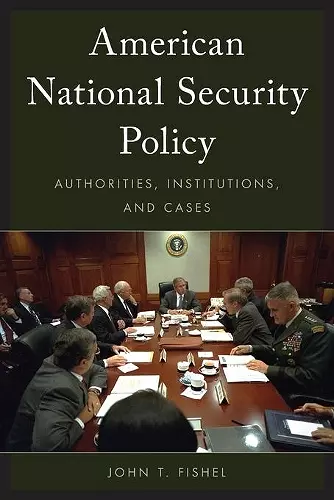American National Security Policy
Authorities, Institutions, and Cases
Format:Paperback
Publisher:Bloomsbury Publishing PLC
Published:15th Feb '17
Currently unavailable, and unfortunately no date known when it will be back
This paperback is available in another edition too:
- Hardback£89.00(9781442248373)

Security policy is a key factor not only of domestic politics in the U.S., but also of foreign relations and global security. This text sets to explain the process of security policy making in the United States by looking at all the elements that shape it, from institutions and legislation to policymakers themselves and historical precedents.
To understand national security policy, the book first needs to address the way national security policy makers see the world. It shows that they generally see it in realist terms where the state is a single rational actor pursuing its national interest. It then focuses on how legislative authorities enable and constrain these policy makers before looking at the organizational context in which policies are made and implemented. This means examining the legal authorities that govern how the system functions, such as the Constitution and the National Security Act of 1947, as well as the various governmental institutions whose capabilities either limit or allow execution, such as the CIA, NSA, etc. Next, the text analyzes the processes and products of national security policy making, such as reports, showing how they differ from administration to administration. Lastly, a series of case studies illustrate the challenges of implementing and developing policy. These span the post-Cold war period to the present, and include the Panama crisis, Somalia, the Balkans Haiti, the Iraq wars, and Afghanistan. By combining both the theory and process, this textbook reveals all aspects of the making of national security policy in United States from agenda setting to the successes and failures of implementation.
American National Security Policy should be read by anyone wanting to be a United States national security professional, by anyone who wants to understand how United States national security policy is formulated, and especially by public policy faculty charged with teaching future national security practitioners. These faculty should use this book in their classes. Superbly organized and clearly written, American National Security Policy is a practitioners’ guide to the subject. It explains succinctly how ideas shape policy makers’ world views and then proceeds to describe clearly each of the elements of the United States national security policy-making process. It also contains a varied and fascinating set of cases, in some of which the author was a direct participant, to illustrate points in a manner useful for future practitioners. Readers seeking fiction or fantasy about United States national security policy should avoid this book. Those compelled by facts should give it their full attention. -- Louis W. Goodman, Emeritus Dean of the School of International Service at American University
John Fishel provides a compelling insider's perspective on some of the most important political crises the United States has faced over the past thirty years, including conflicts in Iraq, Afghanistan, Somalia, Yugoslavia, and Panama. As he adeptly demonstrates, the details matter, and lives are lost or saved depending on a complex interaction of policies, ideological agendas, professional relationships, and decisions made by individuals at all levels of the chain of command. Fishel's work has shaped my thinking about national security strategies for a long time, and it will continue to do so for many years to come. -- Adam Lankford, Criminology Professor, The University of Alabama
This is a realistic book about U.S. security policy and a superb starting point for a course on security policy for leaders or students in any country that deals with America—and that’s most of the world. Fishel’s case studies are redolent with the lessons of the generations who have passed through his classrooms. Security policy making is a living art, and the practice has changed with each of the operations described. This is a readable, teachable, text. We can only hope that somewhere in Moscow and Beijing there are Russian and Chinese counterparts working to explain the reality of those powers’ national security policy making. I think that would help to make the world a safer place. -- David Last, Royal Military College of Canada
ISBN: 9781442248380
Dimensions: 229mm x 148mm x 16mm
Weight: 376g
284 pages